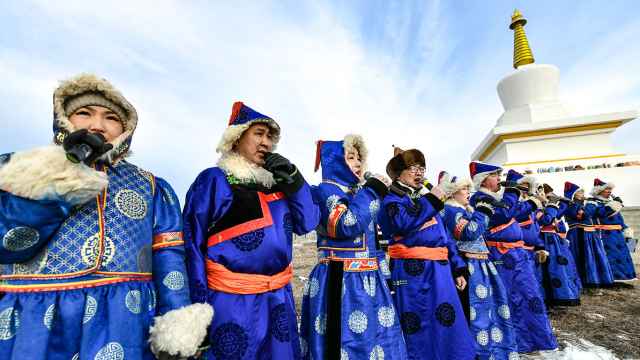TBILISI — It has survived communist oppression, the Cold War, the breakup of the Soviet Union, and counted Josef Stalin and Elvis Presley among its admirers, but at its heart the Georgian National Ballet has always been a bit of a family business.
Founded nearly 70 years ago by the husband and wife team of Iliko Sukhishvili and Nino Ramishvili and initially named the Georgian State Dance Company, the troupe has traveled from the back offices of suspicious state and party officials in 1945 to some of the greatest stages in the world.
The combination of lively music, shows of strength, tornado-fast spins, jumps, swords, shields and daggers for male dancers, matched with the gliding and elegant movements of female performers in vibrantly colored costumes make Georgian dance a dazzling spectacle for audiences.
"I would dare to say other national dance groups in the world don't present such diversity on the stage," said Iliko Sukhishvili Jr., the founder's grandson and current chief choreographer of the troupe.
Georgian dance history goes back many centuries and reflects the national character and ancient history of Georgia, a tiny Caucasus country sandwiched between Russia and Turkey.
One of the oldest Christian nations in the world has always suffered at the hands of invaders, dominated by Arabs, Persians, Turks and of course latterly Russians.
The uneasy historical background of the country has always been reflected in the Georgian dance first choreographed by the original team of Sukhishvili and Ramishvili.
Each dance has a different costume originating from the different regions of a country whose mountainous landscape tumbles down onto the shores of the Black Sea.
In order to persuade officials that his dance company would not offend the Marxist principles of a Soviet state still reeling from the brutalities of World War II, Sukhishvili's grandfather gave a two-hour solo performance for state bosses and secret police in their offices, describing it as a tribute to the pure folklore encouraged by the Communist Party.
"It was one of the most exciting and brave mystifications in Georgia's art history of that time," said granddaughter Nino Sukhishvili, who is now a senior manager of the group.
Since then, there have been full houses in the London's Royal Albert Hall, the Coliseum, New York's Metropolitan Opera House, Madison Square Garden and Milan's La Scala, and the family has remained at the helm. Tengiz, the father of the current Nino and Iliko, was general producer until his death a few years ago.
"Our ballet has become a business card for our country, as its history and the diversity of its regions are all reflected in our two-hour performance," Iliko Sukhishvili Jr. said.
That's probably why founders of the group received offers to stay abroad during tours, including one from George Balanchine, the founding father of modern American ballet.
"The world's No. 1 folk dance company and the former Soviet Union's greatest export," the New York Times once wrote.
However, unlike other Soviet artists such as Mikhail Baryshnikov or Rudolf Nureyev, who defected to the West, the Sukhishvilis stuck it out to see Georgia finally come into its own with the Soviet Union's collapse.
"I think it was not that much about fear, but about love and dedication to their country, I mean Georgia, and a sense of responsibility," Iliko Sukhishvili Jr. said.
The troupe still includes 80 male and 30 female dancers and 15 musicians, and has given more than 10,000 concerts in about 100 countries on five continents.
The program has been altered over the years, and the latest vision from the family at the heart of the troupe has caused some concern among traditionalists.
"I knew that our new program would cause a big discussion in Georgia, and I even wanted that explosion. What is art without such explosions?" Iliko Sukhishvili Jr. said.
He said the new program, which includes more dynamic parts in dances performed by women and more room for improvisations on the stage, was in no way a rejection of the choreography he inherited.
"I had basics, all main geometry of the dance, and I used all of that," he said.
But time is already proving him right and other Georgian dance groups are beginning to copy the moves, just like they did with his grandparents decades ago.
"What is my biggest professional emotion? When I see that something I have had in my mind is transformed into something on a dance floor."
A Message from The Moscow Times:
Dear readers,
We are facing unprecedented challenges. Russia's Prosecutor General's Office has designated The Moscow Times as an "undesirable" organization, criminalizing our work and putting our staff at risk of prosecution. This follows our earlier unjust labeling as a "foreign agent."
These actions are direct attempts to silence independent journalism in Russia. The authorities claim our work "discredits the decisions of the Russian leadership." We see things differently: we strive to provide accurate, unbiased reporting on Russia.
We, the journalists of The Moscow Times, refuse to be silenced. But to continue our work, we need your help.
Your support, no matter how small, makes a world of difference. If you can, please support us monthly starting from just $2. It's quick to set up, and every contribution makes a significant impact.
By supporting The Moscow Times, you're defending open, independent journalism in the face of repression. Thank you for standing with us.
Remind me later.





